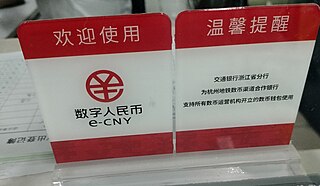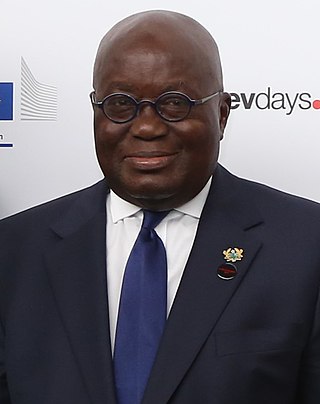
The Bank of Ghana is the central bank of Ghana. It is located in Accra and was formed in 1957. The bank is active in developing financial inclusion policy and is a member of the Alliance for Financial Inclusion.

Nana Addo Dankwa Akufo-Addo is a Ghanaian politician who has served as the president of Ghana since 2017. He previously served as Attorney General from 2001 to 2003 and as Minister for Foreign Affairs from 2003 to 2007 under the Kufuor-led administration.

Akropong is a town in South Ghana and is the capital of the Akuapim North District, a district in the Eastern Region of South Ghana. This town is known for producing snails and palm oil. Akropong has a 2013 settlement population of 13,785 people.

Mahamudu Bawumia is a Ghanaian economist and former central banker who serves as the 5th Vice President of Ghana in the 4th Ghanaian Republic. He assumed office on 7 January 2017 as Vice President of Ghana.

2C2P is a financial services company headquartered in Singapore. The company primarily provides payment gateway services to businesses.

Kenneth Nana Yaw Ofori-Atta, is a Ghanaian investment banker who serves as the Minister for Finance and Economic Planning in the cabinet of Nana Akufo-Addo. He was a co-founder of Databank Group, a Ghanaian financial services company, and served as executive chairman until 2012 when he resigned. He was nominated by President Nana Akufo-Addo on 10 January 2017 and assumed office on 27 January 2017 as finance minister.
Melody Millicent Danquah was a Ghanaian pilot. She was the first female pilot in Ghana and one of the earliest in Africa. She followed in the footsteps of Lotfia Elnadi who was the first Egyptian woman as well as the first woman from Africa to earn a pilot's license on 27 September 1933.
Ernest Kwamina Yedu Addison is a Ghanaian economist Who serves as the current and 15th governor of the Bank of Ghana. He had previously worked at the same central bank as director of research from 2003 to 2011, and as an economist at the African Development Bank.

Daniel Kwaku Botwe is a Ghanaian politician. He is the Member of Parliament of Okere constituency in the Eastern Region of Ghana. He served as Minister for Information and National Orientation in the John Agyekum Kufour administration and also served as the Minister for Regional Reorganization and Development and the Minister for Local Government, Decentralisation and Rural Development in the Nana Akufo-Addo first and second term of office respectively.

A central bank digital currency is a digital currency issued by a central bank, rather than by a commercial bank. It is also a liability of the central bank and denominated in the sovereign currency, as is the case with physical banknotes and coins.
Charles Kofi Adu Boahen is a Ghanaian politician and a public servant. He is a member of the New Patriotic Party and was the deputy minister for Finance in Ghana until November 2022. He is the son of Prof. Albert Adu Boahen, a global academician, historian and politician who became the New Patriotic Party's flagbearer in the 1992 Ghanaian general elections. He was the Minister of State at the Finance Ministry but was dismissed after allegations of corruption.

National Hajj Council is a division under the Pilgrims Affairs Office of Ghana's Ministry of Foreign Affairs. It was set up to oversee the annual airlifting of Ghanaian Hajj pilgrims to Saudi Arabia.
Menzgold Ghana Limited was a fraudulent gold dealership and investment firm that promised customers an average of 7-10 percent monthly returns on investments. It was subsequently shut down by the Government of Ghana. It was founded by Nana Appiah Mensah, who is popularly known as NAM 1. The firm is reported to have initially traded as Menzbank; then changed to Menzbanc and then finally to Menzgold, due to warnings from the Bank of Ghana about the use of 'bank' as a company name for a non-banking entity.

Elsie Addo Awadzi is a Ghanaian international economic and financial lawyer with over 25 years of professional experience working in various capacities in Ghana and internationally. She was appointed by H.E. Nana Addo Dankwa Akuffo Addo The President of the Republic of Ghana as the 2nd deputy governor of the Bank of Ghana in February 2018. She is the second female to hold that position. She was elected as Chairperson of the Alliance for Financial Inclusion's Gender Inclusive Finance Committee in 2020.

The COVID-19 pandemic in Ghana was a part of the worldwide pandemic of coronavirus disease 2019 caused by severe acute respiratory syndrome coronavirus 2. The first two cases in Ghana were confirmed on 12 March 2020, when two infected people came to Ghana, one from Norway and the other from Turkey.

The Government of Ghana initially responded to the virus through a nationwide disinfection and fumigation exercise which began in April 2020. In order to curb the spread of the virus, the government enforced lockdowns, aggressive contact tracing, public bans and social measures such as encouraging the wearing of face masks. By April, it began the gradual reopening of the country; lifting all lockdowns while maintaining protocols such as social distancing. Throughout the pandemic, the government partnered with the private sector in order to roll out economic reliefs and recovery programs as a result of the impact of the pandemic on Ghana's economy. There was also an expansion of medical facilities and the improvement of testing logistics.

The presidency of Nana Akufo-Addo began on 7 January 2017. Following the 2016 Ghanaian general elections, Nana Akufo-Addo the flag-bearer of the New Patriotic Party, succeeded John Mahama as the 12th President of Ghana after winning by a landslide. He won a second term on 9 December 2020 in a tightly contested race against National Democratic Congress (NDC) candidate and former president, John Mahama.
The history of central bank digital currencies (CBDCs) is a short, recent history. CBDCs are still in a conceptual stage, with many countries exploring their possible implementation.

The Digital Rupee (e₹) or eINR or E-Rupee is a tokenised digital version of the Indian Rupee, issued by the Reserve Bank of India (RBI) as a central bank digital currency (CBDC). The Digital Rupee was proposed in January 2017 and launched on December 01, 2022. Digital Rupee is using blockchain distributed-ledger technology.













